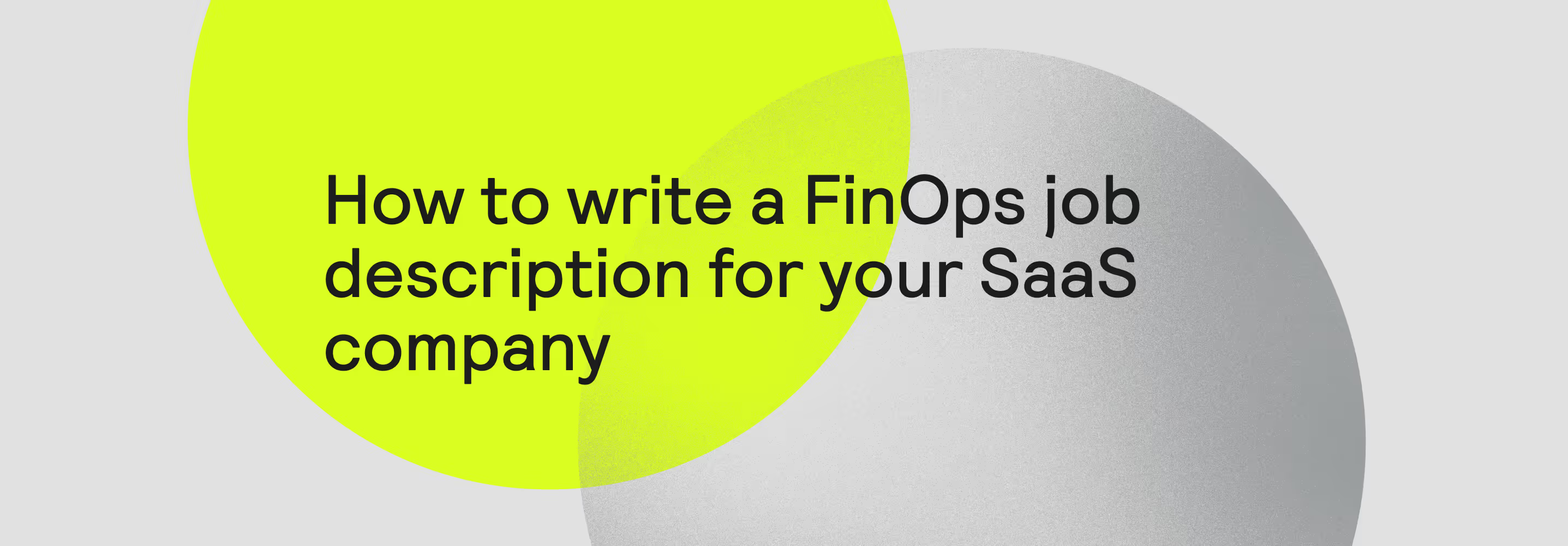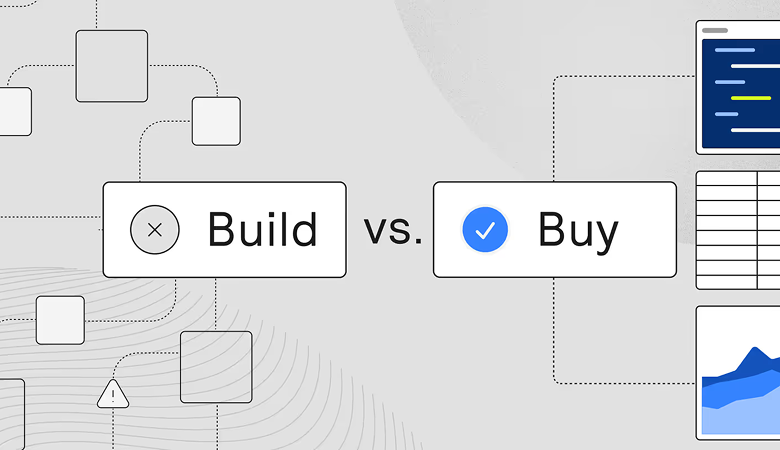In SaaS, where cloud computing reigns supreme, there's a force working behind the scenes to ensure financial health and fuel growth. It's called FinOps.
In this article, we’ll show what a FinOps job description looks like along with a template. We’ll also explain the importance of FinOps in SaaS.
First, let’s see why FinOps is key in SaaS.
Why FinOps in SaaS companies is so important
SaaS companies live and breathe in the cloud.
This offers flexibility and scalability, but it also comes with a unique challenge: Managing cloud costs.
This is where FinOps steps in. It's the perfect marriage of financial management and cloud expertise. It provides a holistic approach to understanding, controlling, and optimizing cloud spending.
More than just cost savings
While cost reduction is a significant benefit, FinOps brings a lot more to the table for SaaS companies:
- Data-driven decisions: FinOps provides the insights needed to make informed choices. These choices cover cloud resource allocation, pricing models, and even product features. Having FinOps experts in your team means using data to drive business strategy.
- Better cash flow: By identifying areas of waste and inefficiency, FinOps helps improve cash flow. This helps guarantee the company has the resources it needs to invest in growth initiatives.
- Improved financial visibility: Gone are the days of waiting for month-end reports. FinOps enables real-time financial reporting. It gives you an up-to-the-minute view of your cloud spending, letting you take proactive action.
- Cross-functional collaboration: FinOps breaks down silos between finance, operations, and engineering teams. It fosters a culture of shared responsibility for cloud costs. The result? Better communication and collaboration across the organization.
A competitive advantage
FinOps is more than just a cost-cutting measure. It's a strategic asset that can give you a significant edge over your competitors.
By embracing FinOps, SaaS companies can:
- Accelerate growth: With optimized cloud spending, you have more resources. You can use these resources to invest in product development, marketing, and customer acquisition.
- Increase profitability: Lowering cloud costs directly impacts your bottom line. As a consequence, it leads to more profitability.
- Boost agility: Real-time financial insights allow you to adapt quickly. This is especially true when there are ever-changing market conditions. These financial insights help you make more informed decisions about resource allocation.
FinOps job description/template
Skilled FinOps managers can orchestrate cost efficiency, data-driven decisions, and better collaboration. Here’s a FinOps job description template that attracts top talent:
Job title: FinOps Manager
Job summary:
We're on the hunt for a detail-oriented financial expert with a passion for cloud tech. As our FinOps manager, you'll be the bridge between finance and engineering. You’ll ensure our cloud spending is under control and optimized for maximum value.
Your goal? To analyze, plan, and communicate, you’ll be guiding us toward a future where cloud costs are predictable and aligned with our business goals.
Key FinOps roles and responsibilities:
- Cloud cost optimization: You’ll analyze cloud usage patterns and find cost-saving opportunities. Essentially, you’ll implement strategies to reduce and control cloud expenditures.
- Financial modeling and analysis: Develop and maintain financial models to forecast cloud costs. You’ll track spending against budgets and provide insights into cost trends and anomalies.
- Cross-functional collaboration: You’ll partner with finance, engineering, and other stakeholders. Your goal will be to communicate the cost implications of technical decisions. You'll also need to foster a cost-conscious culture.
- Vendor management and negotiation: You’ll build and maintain relationships with cloud vendors. You’ll be negotiating contracts and optimizing pricing and service levels.
- Reporting and communication: You’ll prepare reports and dashboards to track cloud spending. The goal is to communicate cost optimization results to stakeholders.
- FinOps implementation and advocacy: You’ll drive the adoption of FinOps principles and best practices. You’ll educate teams on cost-saving strategies, and promote a data-first approach to cloud financial management.
Required skills and qualifications:
- Financial acumen: A solid grasp of financial principles, budgeting, forecasting, and cost analysis is necessary. You're comfortable with numbers and know how to make them tell a story.
- Technical aptitude: Familiarity with cloud infrastructure and services is key. You don't need to be a coder, but you should be able to hold your own in conversations about cloud tech.
- Data knowledge: Proficiency in analyzing data is one of your strengths. You should be familiar with tools like SQL and creating visualizations with BI platforms.
- Excellent communication skills: You have the ability to communicate technical and financial concepts to diverse audiences. You're a translator, making sure everyone is on the same page.
- Problem-solving prowess: You’ve got a knack for identifying and resolving cost-related issues. You should be always balancing the needs of speed, quality, and cost-effectiveness.
Educational requirements:
- Bachelor's degree in finance, accounting, computer science, or a related field
- Relevant certifications (e.g., FinOps Certified Practitioner) are a definite plus
Experience:
- 3+ years of experience in financial analysis, cloud operations, or a related role
- Proven track record of successfully managing and optimizing cloud costs
- Experience with cloud cost management tools and platforms
Interview questions for FinOps managers
We’ll now classify interview questions into five groups with three guiding questions each:
Foundational FinOps knowledge:
- What is your understanding of FinOps, and how does it differ from traditional IT financial management?
This question assesses their fundamental understanding of the field. Remember the difference:
- FinOps is focused on managing the dynamic, real-time costs associated with cloud services, requiring continuous adjustments to optimize spending.
- Traditional IT financial management (ITFM) covers the broader financial oversight of all IT expenditures, including both cloud and on-premises infrastructure, with an emphasis on long-term planning and strategic budgeting.
- Can you explain the key principles and best practices of FinOps?
This one evaluates familiarity with core concepts. These would be cost allocation, show back/chargeback, and continuous optimization.
- How do you stay up to date with the latest trends and technologies in cloud computing and FinOps?
This question gauges commitment to continuous learning and adaptability.
Technical skills and experience:
- Describe your experience working with cloud platforms. Which ones are you most familiar with, and what specific cost optimization tools have you used?
These questions assess hands-on experience and tool proficiency.
- Walk me through your approach to analyzing cloud cost data. What metrics do you focus on, and how do you identify areas for optimization?
This one evaluates analytical skills and methodology.
- Can you give an example of a cloud cost optimization project you've worked on? What were the challenges, your approach, and the results achieved?
This question assesses practical experience and problem-solving skills.
Collaboration and communication:
- How do you effectively communicate complex financial and technical concepts to different stakeholders?
This question evaluates communication skills and the ability to bridge knowledge gaps.
- Describe your experience working in cross-functional teams. How do you build relationships and collaborate with colleagues from different backgrounds?
These ones assess interpersonal and collaboration skills.
- How do you handle conflicts or disagreements within a team, particularly when making decisions about cloud spending or resource allocation?
This question evaluates conflict resolution and decision-making skills.
Problem-solving and critical thinking:
- Scenario-based question: Present a hypothetical scenario involving a cloud cost overrun or inefficiency.
Ask the candidate to analyze the situation, propose solutions, and justify their recommendations. Here’s where you assess their problem-solving skills and analytical thinking.
- What are some common pitfalls or challenges organizations face when implementing FinOps? How would you address them?
These questions evaluate their understanding of potential roadblocks and the proactive approaches they take to mitigation.
- How do you prioritize and balance competing goals in FinOps, such as cost reduction, performance, and innovation?
This question assesses strategic thinking and the ability to navigate trade-offs.
Additional questions tailored to your organization:
- What experience do you have with our specific cloud provider?
- Are you familiar with our current cloud infrastructure and cost management tools?
- How do you see the role of FinOps evolving in the future, and how would you prepare our organization for those changes?
Next steps
Even the most skilled FinOps manager can't reach their full potential without the right tools. The billing side of your SaaS operation can be a major pain point if not managed well.
A transparent billing system is the bedrock of successful FinOps. It eliminates financial surprises, prevents billing disputes, and ultimately reduces financial stress.
That's where Orb comes into the picture.
Orb is a done-for-you billing platform. It’s designed to empower your FinOps manager. Our mission is to equip your team with the insights and automation they need. Especially those that maximize the value of your cloud investments.
Here's how Orb supports your FinOps manager:
- Unified insights: Orb integrates with your current cloud infrastructure, CRM, and payment gateways. We provide a centralized view of your billing and usage data in real-time. This gives your FinOps manager the info it needs to make better business decisions.
- Adaptable pricing structures: Orb handles a wide array of pricing models. This includes simple subscriptions and complex usage-based pricing. This lets your FinOps manager align your billing strategy with customer usage patterns.
- Effortless billing automation: Orb automates the entire billing process. We cover everything from invoice generation and delivery to payment collection and reconciliation. This frees up your FinOps manager to focus on strategic initiatives, not trivial tasks.
- Customer usage clarity: Orb delivers deep insights into how your customers use your product. Your FinOps manager can use these insights to identify trends, anticipate demand changes, and deal with issues.
Ready to see how Orb can become the foundation of your FinOps success? Schedule a demo.



